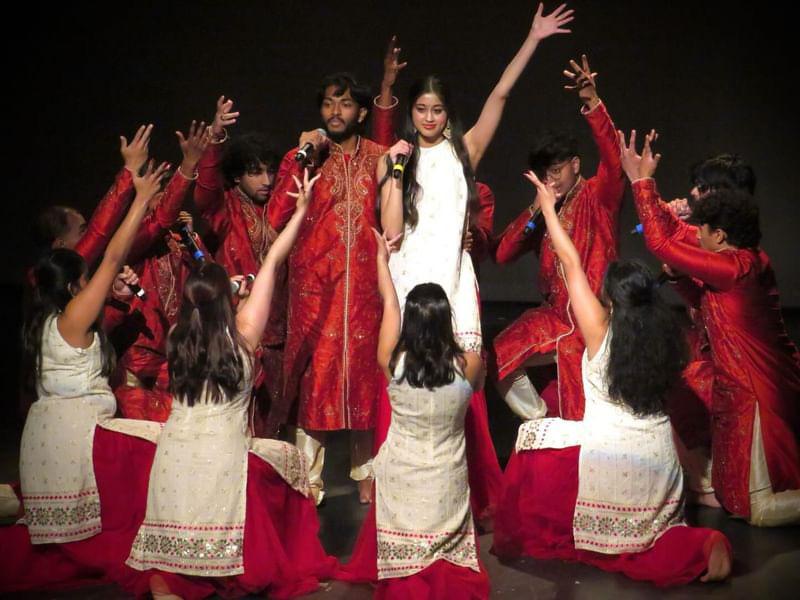UTD students travel across the country from California to Atlanta, taking stages bathed in warm lights. This a cappella group, a self-identified found family, doesn’t just belt notes — they blend worlds, creating a fusion of South Asian rhythms and Western harmonies.
Dhunki A Cappella, the premier competitive South Asian fusion a cappella team at UTD, focuses on seamlessly blending Indian and Western music. Membership fluctuates, capped at 18, with 15 members this past year. Founded in 2013, the group’s Hindi name means “spellbound,” with “Dhun” meaning “tune” or “melody,” reflecting Dhunki’s focus on spreading South Asian music and culture.
Neuroscience junior and music director Tanav Chachad said Dhunki’s unique blend fosters a sense of community and strengthens members’ cultural identity, making the group more than just a musical team, given the small, close-knit group of people.
“[Dhunki] is really a family,” Chachad said. “We are super close, spending a lot of time together, especially for long practice competitions and traveling.”
Chachad said Dhunki’s unique competitive edge lies in their performances. The team competes in circuits like ASA, a South-Asian a cappella circuit, with singing and dancing performances. The repertoire induces classic and modern South Asian songs in Hindi, Telugu, Tamil and other languages, mixed with Western popular music spanning across various genres, creating mashups that highlight similar tunes, rhythms or themes.
“One of the things that we do in Indian classical music is known as jathis,” Chachad said. “They are really fast-spoken syllables that are a rhythmic portion of the song, and it adds a lot of texture, a lot of high, fast-paced rhythms moving back and forth within the music.”
Dhunki competes in two major competitions each spring semester, beginning with applications and rankings in the fall. This past year, Dhunki placed second at Jeena and first at Gathe Raho. The group has previously won first place several times, including the All-American Awaaz national competition hosted by ASA in 2022. Anoushka Majumdar, a finance senior and captain of Dhunki, said the competitions unite the group.
“We all love one another at the end of the day and we all have a mutual understanding of each other,” Majumdar said. “We spend a lot of time together … something like that brings you so much closer to the team.”
Currently, the group is recruiting new members, with auditions open to all and no prior experience required. Auditions will be held two weeks after the beginning of fall semester and those interested can find more information on the group’s Instagram @dhunkimusic. Members come from all walks of life and different majors, some with years of training in classical Indian singing and others with no prior musical experience, with the majority coming from Indian backgrounds. Chachad said commitment and a willingness to learn are the key criteria they look for in applicants. CITS sophomore and member Ritul Nagamanickam said he joined Dhunki with no formal musical background.
“I might have done karaoke a couple of times, but I came in thinking it would just be singing around campus, doing some fun stuff as a club, so it was completely new to me,” Nagamanickam said. “I’ve completely fallen in love with the whole concept of a capella now.”
Chachad said that many members, being children of South Asian immigrants, find Dhunki an essential part of their cultural identity.
“Dhunki has allowed us to explore and appreciate aspects of our culture that we might not have been exposed to otherwise Through our performances, we learn about different regional music styles and languages, deepening our connection to our roots,” Chachad said.
Majumdar said that for many members, Dhunki is a way to stay connected with their South Asian heritage and bridge the connection between family background and culture.
“It’s not just about singing,” Majumdar said. “It’s about embracing and showcasing our heritage.”
She said audience reactions have been very positive, with the group’s efforts well-received within the South Asian community at UTD and beyond. Dhunki is commonly invited to perform at cultural events and celebrations like SMU’s Diwali event, as well as weddings and birthdays where they sometimes play older and niche Indian songs such as “Mitwa” and “Aaj Jane Ki Zid Na Karo.”
“There’s so many Indian students at UTD,” Majumdar said. “So. it’s been fun to share that with them and help them embrace their culture a little bit more.”







